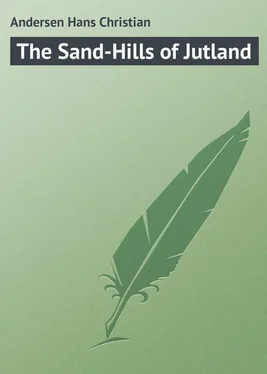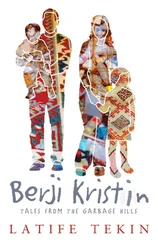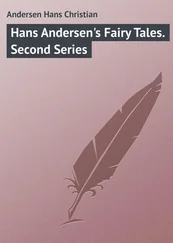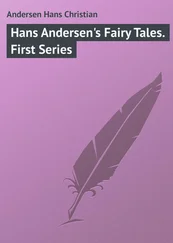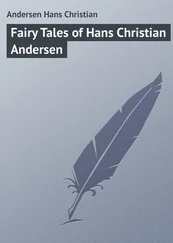Andersen Hans - The Sand-Hills of Jutland
Здесь есть возможность читать онлайн «Andersen Hans - The Sand-Hills of Jutland» — ознакомительный отрывок электронной книги совершенно бесплатно, а после прочтения отрывка купить полную версию. В некоторых случаях можно слушать аудио, скачать через торрент в формате fb2 и присутствует краткое содержание. Жанр: foreign_language, foreign_prose, на английском языке. Описание произведения, (предисловие) а так же отзывы посетителей доступны на портале библиотеки ЛибКат.
- Название:The Sand-Hills of Jutland
- Автор:
- Жанр:
- Год:неизвестен
- ISBN:нет данных
- Рейтинг книги:5 / 5. Голосов: 1
-
Избранное:Добавить в избранное
- Отзывы:
-
Ваша оценка:
- 100
- 1
- 2
- 3
- 4
- 5
The Sand-Hills of Jutland: краткое содержание, описание и аннотация
Предлагаем к чтению аннотацию, описание, краткое содержание или предисловие (зависит от того, что написал сам автор книги «The Sand-Hills of Jutland»). Если вы не нашли необходимую информацию о книге — напишите в комментариях, мы постараемся отыскать её.
The Sand-Hills of Jutland — читать онлайн ознакомительный отрывок
Ниже представлен текст книги, разбитый по страницам. Система сохранения места последней прочитанной страницы, позволяет с удобством читать онлайн бесплатно книгу «The Sand-Hills of Jutland», без необходимости каждый раз заново искать на чём Вы остановились. Поставьте закладку, и сможете в любой момент перейти на страницу, на которой закончили чтение.
Интервал:
Закладка:
He would not be kept long here; he would be removed to Ringkjöbing, where the prison was equally strong.
These times were not like ours. It went hard with the poor then; for then it had not come to pass that peasants found their way up to lordly mansions, and that from these regiments coachmen and other servants became judges in the petty courts, which were invested with the power to condemn, for perhaps a trifling fault, the poor man to be deprived of all his goods and chattels, or to be flogged at the whipping-post. A few of these courts still remain; and in Jutland, far from "the King's Copenhagen," and the enlightened and liberal government, even now the law is not always very wisely administered: it certainly was not so in the case of poor Jörgen.
It was bitterly cold in the place where he was confined. When was this imprisonment to be at an end? Though innocent, he had been cast into wretchedness and solitude – that was his fate. How things had been ordained for him in this world, he had now time to think over. Why had he been thus treated – his portion made so hard to bear? Well, this would be revealed "in that other life" which assuredly awaits all. In the humble cottage that belief had been engrafted into him, which, amidst the grandeur and brightness of his Spanish home, had never shone upon his father's heart: that now, in the midst of cold and darkness, became his consolation, God's gift of grace, which never can deceive.
The storms of spring were now raging; the roaring of the German Ocean was heard far inland; but just when the tempest had lulled, it sounded as if hundreds of heavy wagons were driving over a hard tunnelled road. Jörgen heard it even in his dungeon, and it was a change in the monotony of his existence. No old melody could have gone more deeply to his heart than these sounds – the rolling ocean – the free ocean – on which one can be borne throughout the world, fly with the wind, and wherever one went have one's own house with one, as the snail has his – to stand always upon home's ground, even in a foreign land.
How eagerly he listened to the deep rolling! How remembrances hurried through his mind! "Free – free – how delightful to be free, even without soles to one's shoes, and in a coarse patched garment!" The very idea brought the warm blood rushing into his cheeks, and he struck the wall with his fist in his vain impatience. Weeks, months, a whole year had elapsed, when a gipsy named Niels Tyv – "the horse-dealer," as he was also called – was arrested, and then came better times: it was ascertained what injustice had been done to Jörgen.
To the north of Ringkjöbing Fiord, at a small country inn, on the evening of the day previous to Jörgen's leaving home, and the committal of the murder, Niels Tyv and Morten had met each other. They drank a little together, not enough certainly to get into any man's head, but enough to set Morten talking too freely. He went on chattering, as he was fond of doing, and he mentioned that he had bought a house and some ground, and was going to be married. Niels thereupon asked him where was the money which was to pay it, and Morten struck his pocket pompously, exclaiming in a vaunting manner, —
"Here, where it should be!"
That foolish bragging answer cost him his life; for when he left the little inn Niels followed him, and stabbed him in the neck with his knife, in order to rob him of the money, which, after all, was not to be found.
There was a long trial and much deliberation: it is enough for us to know that Jörgen was set free at last. But what compensation was made to him for all he had suffered that long weary year in a cold, gloomy prison; secluded from all mankind? Why, he was assured that it was fortunate he was innocent, and he might now go about his business! The burgomaster gave him ten marks for his travelling expenses, and several of the townspeople gave him ale and food. They were very good people. Not all, then, would "skin you, and lay you on the frying-pan!" But the best of all was that the trader Brönne from Skagen, he to whom, a year before, Jörgen intended to have hired himself, was just at the time of his liberation on business at Ringkjöbing. He heard the whole story; he had a heart and understanding; and, knowing what Jörgen must have suffered and felt, he was determined to do what he could to improve his situation, and let him see that there were some kind-hearted people in the world.
From a jail to freedom – from solitude and misery to a home which, by comparison, might be called a heaven – to kindness and love, he now passed. This also was to be a trial of his character. No chalice of life is altogether wormwood. A good person would not fill such for a child: would, then, the Almighty Father, who is all love, do so?
"Let all that has taken place be now buried and forgotten," said the worthy Mr. Brönne. "We shall draw a thick line over last year. We shall burn the almanac. In two days we shall start for that blessed, peaceful, pleasant Skagen. It is said to be only a little insignificant nook in the country; but a nice warm nook it is, with windows open to the wide world."
That was a journey – that was to breathe the fresh air again – to come from the cold, damp prison-cell out into the warm sunshine!
The heather was blooming on the moorlands; the shepherd boys sat on the tumuli and played their flutes, which were manufactured out of the bones of sheep; the Fata Morgana, the beautiful mirage of the desert, with its hanging seas and undulating woods, showed itself; and that bright, wonderful phenomenon in the air, which is called the "Lokéman driving his sheep."
Towards Limfiorden they passed over the Vandal's land; and towards Skagen they journeyed where the men with the long beards, Langbarderne , 1 1 Langobarder, a northern tribe, which, in very ancient times, dwelt in the north of Jutland. From thence they migrated to the north of Germany, where, according to Tacitus, they lived bout the period of the birth of Christ, and were a poor but brave people. Their original name was Vinuler, or Viniler. "When these Viniler," say the traditions, or rather fables of Scandinavia, "were at war with the Vandals, and the latter went to Odin to beseech him to grant them the victory, and received for answer that Odin would award the victory to those whom he beheld first at sunrise, the warlike female, Gambaruk, or Gunborg, who was mother to the leaders of the Viniler – Ebbe and Aage – applied to Frigga, Odin's wife, to entreat victory for her people. The goddess advised that the females of the tribe should let down their long hair so as to imitate beards, and, early in the morning, should stand with their husbands in the east, where Odin would look out. When, at sunrise, Odin saw them, he exclaimed, 'Who are these long-bearded people?' whereupon Frigga replied, that since he had bestowed, a name upon them, he must also give them the victory. This was the origin of the Longobardi , who, after many wanderings, found their way into Italy, and, under Alboin, founded the kingdom of Lombardy." — Trans.
came from. In that locality it was that, during the famine under King Snio, all old people and young children were ordered to be put to death; but the noble lady, Gambaruk, who was the heiress of that part of the country, insisted that the children should rather be sent out of the country. Jörgen was learned enough to know all about this; and, though he was not acquainted with the Langobarders' country beyond the lofty Alps, he had a good idea what it must be, as he had himself, when a boy, been in the south of Europe, in Spain. Well did he remember the heaped-up piles of fruit, the red pomegranate flowers, the din, the clamour, the tolling of bells in the Spanish city's great hive; but all was more charming at home, and Denmark was Jörgen's home.
Интервал:
Закладка:
Похожие книги на «The Sand-Hills of Jutland»
Представляем Вашему вниманию похожие книги на «The Sand-Hills of Jutland» списком для выбора. Мы отобрали схожую по названию и смыслу литературу в надежде предоставить читателям больше вариантов отыскать новые, интересные, ещё непрочитанные произведения.
Обсуждение, отзывы о книге «The Sand-Hills of Jutland» и просто собственные мнения читателей. Оставьте ваши комментарии, напишите, что Вы думаете о произведении, его смысле или главных героях. Укажите что конкретно понравилось, а что нет, и почему Вы так считаете.
